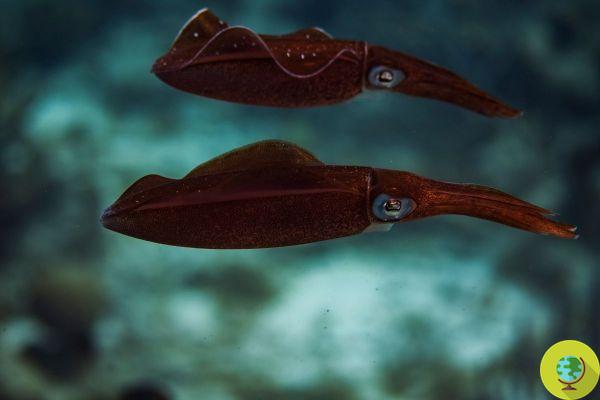
The Lesson squid is committed to looking for a place to mate with its mate and to take care of the little ones
Lesson's squid is committed to finding a place to mate with its mate and to take care of the young - hitherto seen only in monogamous vertebrates such as birds
Squids are generally not considered to be very loving parents - especially the males, who tend to mate and then disappear leaving their mate alone. That's why scientists were surprised to find that a small squid that lives along the reef, the Lesson squid (Sepioteuthis lessoniana Lesson), is actually an attentive and present father for his children.
The males of this species observed so far have proved to be very competitive in fighting for the females and, after mating, staying close to their mate to prevent some rival from 'sneaking' and then continuing to keep an eye on the eggs laid by the companion for some time, before moving away and looking for a new mate to mate with.
However, a recent observation in the Red Sea, Egypt, surprised scientists: a male of the species, immediately after mating, scares rivals by waving its tentacles and changing the color of its skin; then they leave their mate alone for a few moments, heading out to patrol what could serve as a nest to lay their eggs.
(Read also: For animals there is no Valentine's Day. For them it is increasingly difficult to mate (because of man))
This behavior of the male could be defined as a real search for the ideal nest before the female lays her eggs. An attitude not uncommon, if we think of monogamous animal species such as birds, but practically never seen among cephalopods - which demonstrates how much the mating practices of squid are still unknown to scientists, and how much still have to be investigated.
But why leave your partner alone? Even a very brief absence of the male would allow rivals to mate with her, threatening the success of reproduction. According to the scientists, it is a search for the safest nest for the eggs, sheltered from other males or predators, thus contributing more actively to the reproductive process than do other species of squid that move away after fertilization, leaving the single companions to take care of the eggs and the young (in many species, the females even die after the eggs have hatched).
For now, most of the studies conducted on the behavior of cephalopods have taken place on specimens present in aquariums, but the artificial environments are too 'simple' and do not present those dangers from which the squid should be warned - which is why the phenomenon so far has not had never registered. Further studies in the wild are needed to see if other squid species also exhibit similar post-reproductive behavior.
Follow us on Telegram | Instagram | Facebook | TikTok | Youtube
Fonte: Ecology
We also recommend:
- The horrifying spectacle of 10.000 giant squid beached in Chile (PHOTO)
- The Toyama Bay Firefly Squid Show
- The Great Barrier Reef will not end up on the Unesco black list (at least until 2022)


























